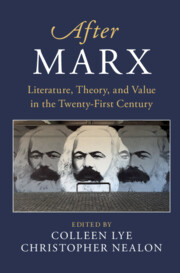Book contents
- After Marx
- After Series
- After Marx
- Copyright page
- Contents
- Contributors
- Acknowledgments
- Introduction
- Chapter 1 Black Marxism and the Antinomies of Racial Capitalism
- Chapter 2 Eco-Criticism and Primitive Accumulation in Indigenous Studies
- Chapter 3 Screening Insurrection: Marx, Cinema, Revolution
- Chapter 4 Marxist Ecology and Shakespeare
- Chapter 5 There Is No “More Commodification”: Periodizing Capitalist Transformation
- Chapter 6 The Irreconcilable: Marx after Literature
- Chapter 7 The Rise and Fall of the English-Language Literary Novel since World War II
- Chapter 8 Literature and the State
- Chapter 9 Post-Soviet Aesthetics
- Chapter 10 Lu Xun’s Literary Revolution in Chinese Marxism
- Chapter 11 Latin American Literature and Dependency Theory Today
- Chapter 12 Industry Culture: Labor and Technology in Marxist Critical Theory
- Chapter 13 In Service to Capital: Theater and Marxist Cultural Theory
- Chapter 14 Hidden Abodes and Inner Bonds: Literary Study and Marxist-Feminism
- Chapter 15 Poetry and Revolution
- Index
- References
Chapter 6 - The Irreconcilable: Marx after Literature
Published online by Cambridge University Press: 12 March 2022
- After Marx
- After Series
- After Marx
- Copyright page
- Contents
- Contributors
- Acknowledgments
- Introduction
- Chapter 1 Black Marxism and the Antinomies of Racial Capitalism
- Chapter 2 Eco-Criticism and Primitive Accumulation in Indigenous Studies
- Chapter 3 Screening Insurrection: Marx, Cinema, Revolution
- Chapter 4 Marxist Ecology and Shakespeare
- Chapter 5 There Is No “More Commodification”: Periodizing Capitalist Transformation
- Chapter 6 The Irreconcilable: Marx after Literature
- Chapter 7 The Rise and Fall of the English-Language Literary Novel since World War II
- Chapter 8 Literature and the State
- Chapter 9 Post-Soviet Aesthetics
- Chapter 10 Lu Xun’s Literary Revolution in Chinese Marxism
- Chapter 11 Latin American Literature and Dependency Theory Today
- Chapter 12 Industry Culture: Labor and Technology in Marxist Critical Theory
- Chapter 13 In Service to Capital: Theater and Marxist Cultural Theory
- Chapter 14 Hidden Abodes and Inner Bonds: Literary Study and Marxist-Feminism
- Chapter 15 Poetry and Revolution
- Index
- References
Summary
This chapter revisits and transforms the idea, associated with Georg Lukács but an oft-unstated convention of literary studies, that the novel is the exemplary literary form of the capitalist era, arising from and expressing its basic logic and social relations. Its argument depends on a double specification: that what distinguishes the capitalist era is accumulation at a global scale; and that the realist novel’s paradigmatic trope, which Lukács calls “reconciliation,” refers not to a general social phenomenon but to the problematic individual’s reconciliation with social production, their internalization into the circuits that enable accumulation. Accumulation somewhere, that is to say, is the social basis of the novel. The chapter reads the contemporary political economy of the world-system, with the Eurozone – the realist novel’s home countries – as its leading case, and Greece as its irremediably problematic economy, arriving at the conclusion that as accumulation wanes, so must the novel itself.
- Type
- Chapter
- Information
- After MarxLiterature, Theory, and Value in the Twenty-First Century, pp. 101 - 115Publisher: Cambridge University PressPrint publication year: 2022

